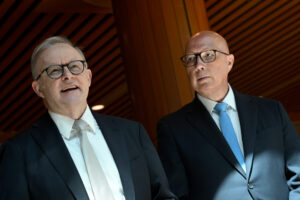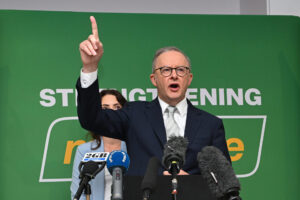by Ebony Bennett
[Originally published in The Canberra Times, 03 April 2020]
It’s not every day I get up at 6am to talk about inequality with a Nobel Prize winner, but hosting the Australia Institute’s Economics of a Pandemic webinar series afforded me that opportunity this week.
Before dawn on Thursday, Professor Joseph Stiglitz of Columbia University, joined by former treasurer Wayne Swan and the Australia Institute’s chief economist Richard Denniss, delivered some sobering news to the 2000 people who tuned in from across the globe: the idea of an economic “snap back” is nothing but a fantasy.
Governments are hoping for a V-shaped recovery, where economic growth plummets and then quickly recovers. But hope is not a strategy, and respected economists like Stiglitz are warning that if we don’t get the economic response right the economic recovery could look W-shaped – or worse, a “bathtub” where growth plummets and is followed by a prolonged depression that will only make inequality worse here and in the United States.
The bathtub scenario is not inevitable, but if it happens it will be because governments made poor decisions about the recovery. Just as austerity amplified the effects of the global financial crisis in the UK (the number of people relying on food banks tripled after the GFC was over, not during it), if Australia implements a program of austerity – cuts to welfare spending, deregulation and weakened protections for workers – it would be a recipe for a depression not a recovery.
The truth is, the Morrison government needs to come to terms with the fact that a very large role for government is going to be required not just for the next six months, but possibly the next six years. The silver lining of our recent history with the GFC means we have some recent evidence about which fiscal measures work and which do not.
Firstly, on tax reform, Stiglitz says cutting company taxes will not work. He points out that in 2017 the Trump administration implemented massive company tax cuts and “the evidence was unambiguous. It did not stimulate investment. What it did is lead to almost a trillion dollars of share buybacks … and a trillion-dollar fiscal deficit”. Few companies will invest when everything is so uncertain, which makes a company tax cut a poor choice in terms of bang for fiscal buck.
Secondly, the economic recovery plans need to invest in projects that are labour-intensive, have a high degree of local production and deliver lasting benefits to the community: labour, local, lasting. When it comes to stimulating economic activity, tax cuts can’t compete with well-targeted government spending.
Thirdly, we need use this situation as an opportunity to strengthen our social safety net. Stiglitz talked about how inequality was spreading the virus because so many workers without paid sick leave, who live pay-cheque-to-pay-cheque, simply could not afford to stay at home, putting both themselves and the community at risk. Meanwhile, those without jobs are turning to soup kitchens to survive – a clear failure of government. Here in Australia, talk of plunging the JobSeeker payment (formerly Newstart) back below the poverty line is downright cruel, as well as economically irresponsible.
Whenever a government minister mentions cutting JobSeeker, they are effectively advocating a policy of starvation – it’s well-documented that there were people on Newstart who were regularly forced to skip meals to survive. When the government knows unemployment is likely to stay high for years to come, such a policy would be unconscionable and ruin countless lives.
Lastly, Stiglitz finished on a hopeful note: “The government is really coming to the rescue of our entire economy. And … we ought to use that money to reshape the economy, to reflect our values. And that means reshape it in the direction towards a greener economy, reshape it in a direction towards more shared prosperity … with less inequality.”
Transitioning to a cleaner economy has been the source of some of Australia’s most toxic politics of the last decade. Unlike with coronavirus, when it comes to climate change successive Coalition governments have ignored science and expertise and instead clung to ideology and special interests.
Hopefully that era has ended.
The economics of renewables have never been better. This week the Australia Energy Market Operator said Australia’s electricity grid could run with 75 per cent renewables by 2025. That’s great news for climate policy, but even better news for consumers.
However, AEMO chief executive Audrey Zibelman also warned that “to do so requires changes in our markets and regulatory requirements. Otherwise, AEMO will be required to limit the contribution of these wind and solar resources to 50 per cent or 60 per cent of electricity supply at any point in time, even though they are the lowest-cost way of providing electricity”.
MORE EBONY BENNETT:
- What should we keep from the old economy, and what should we build anew?
- Oversight is essential in the fast-moving crisis that is COVID-19
- Bootstraps don’t cut it in a public health crisis
That means any attempt to throw up regulatory or market barriers to renewables is essentially keeping electricity prices high. Renewables are the cheapest way of providing electricity. Energy Minister Angus Taylor’s main job is to reduce electricity prices for everyone, and the AEMO has said it can be done within the next five years if we drop the market and regulatory barriers to renewables. Good for reducing inequality (cheaper bills), good for economic recovery, good for the environment.
There has been a lot of talk about a gas-fired recovery, but even though gas production has never been higher, the cost of gas has tripled in recent years. In the same period, the cost of building new renewables has never been cheaper – and of course once solar and wind farms are built there are no more fuel costs. Ever. It’s hard for expensive gas and coal to compete with that – but if we see a slew of new government support for gas and not solar, we’ll know that special interests have won out over science once again.
If Minister Taylor announces gas projects, he’s choosing to make electricity more expensive for households and business during a time when people need lower bills more than ever. You don’t need to be a Nobel laureate economist to know that’s a stupid idea.
- Ebony Bennett is the deputy director at independent think tank the Australia Institute. Twitter: @ebony_bennett. The video recording of the Joseph Stiglitz webinar is available at the top of this page or at tai.org.au/webinars
Between the Lines Newsletter
The biggest stories and the best analysis from the team at the Australia Institute, delivered to your inbox every fortnight.
You might also like
5 ways and 63 billion reasons to improve Australia’s tax system
With a federal election just around the corner, new analysis from The Australia Institute reveals 63 billion reasons why our next Parliament should improve the nation’s tax system.
10 reasons why Australia does not need company tax cuts
1/ Giving business billions of dollars in tax cuts means starving schools, hospitals and other services. Giving business billions of dollars in tax cuts means billions of dollars less for services like schools and hospitals. If Australia cut company tax from 30% to 25% this would give business about $20 billion in its first year,
Business groups want the government to overhaul the tax system? Excellent – we have some ideas.
The landslide win by the ALP has seen business groups come out demanding the government listen to their demands despite having provided them no support, and plenty of opposition, over the past 3 years.

